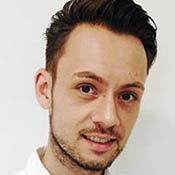Teaching and learning
A variety of teaching and learning activities are used throughout our MPharm courses.
These include lectures, tutorials, practical classes, computer and team-based learning sessions, and research projects.
You will also get involved with group work, including working as part of an inter-professional team with students from other medicine-related programmes.
As a formal part of all four years of your studies, you will attend clinical tutorials that are run within hospital settings by experienced clinical tutors.
We also have students who undertake the Manchester Leadership Programme to develop additional skills.
"The Manchester MPharm has allowed me to pursue my passions in patient care and education, and offered me avenues I had not considered when I decided to follow this path."
Andrew Mawdsley / Clinical Pharmacist/Lecturer and MPharm alumnus
Assessments
Your knowledge will be assessed using a variety of methods, including:
- practical reports and examinations;
- group work;
- peer assessment;
- oral presentations;
- end-of-semester examinations.
Your report writing skills will be assessed throughout the course, while your practical skills will be continuously assessed during practical classes.
Your final degree mark is based on the results of second, third and fourth-year examinations, as well as the fourth-year project. Read about a dissertation project on waste medicines on the Faculty student blog.
Placements
You will undertake placements in hospital, community, general practice and mental health settings as part of the course, as well as an optional industrial placement.
All years
In all years of the MPharm, you will have the opportunity to use offsite facilities when you spend time in pharmacy departments and on wards in one of three local NHS trusts.
You will get the opportunity to spend time in community pharmacy in all four years of the course. These placements are integrated so that you can apply the knowledge taught at university to real-life situations in community pharmacy.
You will be supported to interact with members of the pharmacy team, as well as patients, carers and other healthcare professionals, helping you to develop both professionalism and communication skills.
Year 1
Year 1 placements are based on orientation and observational learning and, by the final year, will help you to transition to pre-registration and emerging roles.
Years 2 and 3
You will have the opportunity to undertake a placement in the pharmaceutical industry in Year 3. This placement includes hands-on time in laboratories, working on small-scale research projects. Some students who have undertaken these placements have gone on to gain pre-registration training and work in the industry.
Year 3 students will also undertake a half-day placement at a mental health hospital.
Year 4
You will undertake a placement in general practice, where you will shadow a practice pharmacist. During this placement, you will have an opportunity to work with an Independent Prescribing pharmacist and understand their role within a multi-disciplinary team.
You will also learn about managing asthma and how to deliver an asthma clinic.
Placement locations
The trusts we send students to are:
University Hospital of South Manchester NHS Foundation Trust (UHSMT)
The pharmacy department of the University Hospital of South Manchester NHS Foundation Trust provides dispensing services and a full clinical pharmacy service to wards and departments at Wythenshawe Hospital.
Salford Royal NHS Foundation Trust (SRFT)
SRFT offers a wide range of pharmaceutical services to patients and staff at:
- Salford Royal
- the local primary care trust
- St Ann's Hospice
- a local private hospital.
Central Manchester University Hospitals NHS Foundation Trust (CMFT)
The Pharmacy Directorate provides services to patients at:
- Royal Manchester Children's Hospital (RMCH)
- Manchester Royal Eye Hospital (MREH)
- Manchester Royal Infirmary (MRI)
- Saint Mary's Hospital (SMH)
- Trafford General Hospital
- University Dental Hospital of Manchester
- community services.
Teaching innovation
Our lecturers use clickers, or student response systems, to test the understanding of students in class.
Clickers are a technology used to promote active learning and can help lecturers by:
- actively engaging students during the entire class period;
- gauging their level of understanding of the material being presented;
- providing prompt feedback to student questions.
Using the clicker system, a lecturer can ask the class a question and get an immediate response to see how well they have understood the teaching.

